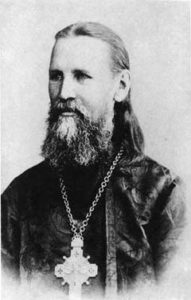SSCORRE!
Saint Sophia Cathedral
Online Resources for our Religious Edification

Topic of the Week:
Passions
“…if we would force ourselves from the start, then with continual labor we would advance little by little and perfect the virtues with ease; because seeing that we are forcing ourselves, God gives us help. And so let us force ourselves, let us make a good beginning, let us fervently desire the good; for although we have not yet attained perfection, this very desire is already the beginning of our salvation—from this desire we begin with God’s help to labor also, and through labor we receive help in acquiring virtues. Therefore one of the fathers has said, “Give blood and receive spirit.” That is, struggle, and you will receive the habit of virtue.
…We should test ourselves not only every day, but also every year and every month and every week and say, “Last week this passion troubled me very much, but now what sort am I?” Likewise every year one should ask himself: “Last year I was so conquered by this passion, and now what sort am I?”…”
Excerpted from The Tenth Instruction. That We Should Traverse the Godly Path with Understanding and Heedfulness
Adult/Family:“There are three attitudes of soul in a man: Either he acts according to passion, he opposes passion, or he uproots it.
- He acts according to passion who fulfills it and satisfies it.
- He opposes passion who does not act according to it, neither does he not cut it off, but struggles so that the passion might pass; nonetheless he still has it within himself.
- And he uproots passion who labors and does what is opposed to the passion.
But these three attitudes have a very broad application. For example… we are quite conquered by vainglory…. a man cannot bear to hear a word from his brother. When one person hears a single word, he becomes upset or answers five or ten words to his brother’s one, and becomes hostile and bitter. When the quarrel is ended he continues to have thoughts against the one who said it to him, he remembers the insult and regrets that he did not say more than he did in reply. He conjures to himself ever stronger words to tell him later. He repeats to himself, “Why didn’t I say this or that to him, why did he say that to me, and I will tell him such and such,” and he continues to be angry. This is one attitude. This means that evil has been converted into habit. May God deliver us from such an attitude for it unfailingly leads to torments—for every sin which is fulfilled in deed leads to hell, and although such a man might desire to repent, he alone cannot conquer passions unless he receives help from some saints…. This is why I constantly say to you: Strive to cut off the passions before they become a habit in you. One person hears an offensive word, and although he is disturbed and returns five or ten words to the one, regretful that he did not say three other stronger ones, grieves and remembers the wrong—nevertheless he has a change of heart after a few days. Another spends a week in a like state and then changes; and still another changes within a day. One person is offended, quarrels, becomes disturbed and disturbs others, but is then immediately converted. So you see how many different attitudes there are! However, all these people are subject to hell as long as they fulfill their passions.
Let us speak now of those who oppose the passions. One person when he hears a word is saddened, not because he has been offended, but because he did not bear this offense: this person is in the state of those who are laboring and opposing the passions. Another person is laboring and struggling in asceticism, but at last he is conquered by the compulsion of passion. Yet another wishes to reply in an offensive way, but avoids this because of habit. Another one strives not to say anything at all offensive, but he grieves at being reproached; however he condemns himself and repents that he grieves. Yet another is not embittered by the offense, but he also does not rejoice over it. These are the kinds of people who oppose the passions. However, two of them are to be distinguished from the rest—those who are conquered amidst the struggle and those who are attracted to a passion by habit and are thereby threatened with falling into the same danger as those who act according to passions. I have included them among those who are opposing the passions, for by their good intention they have stopped the passion and do not wish to act according to it, but they are also saddened and continue to struggle. The Fathers have said, that anything that goes against the soul’s own desire cannot not last long. But these people must test themselves in order to see whether they do not perform, if not the passion itself, then something which arouses passion, which is why they are conquered or attracted by it. There are also those who strive to stop the passion, but only by instilling another passion: one person is silent because of vainglory, another because of man-pleasing, or from some other kind of passion. Such people want to heal evil by means of evil. But Abba Poemen said that evil can in no way uproot evil. These people are among those who act according to passion, although they succeed in deceiving even themselves.
Finally we would like to speak of those who are uprooting passion. One rejoices when he is offended, but this is because he has in view the reward. He belongs to those who are uprooting passion, but not with understanding. Another rejoices when he receives offense—he considers that he should have endured this offense because he himself gave occasion for this: he is uprooting passion with understanding. To receive offence, to lay the blame upon oneself and consider everything which comes against us as our own is a work of understanding, because everyone who prays to God, “Lord, grant me humility,” should know that he is entreating God to send him someone to offend him. Therefore, when someone offends him he himself should reproach himself and belittle himself mentally, so that at that time when another is humbling him from outside, he himself has humbled himself from within. Yet another not only rejoices when he is offended and considers himself to be guilty, but he also is sorry for the disturbance of the one who offends him. May God lead us to such an attitude.
Do you see how broad are these three attitudes? And so let each of us examine, as I have said, which state he is in. Does he willingly act according to passion and satisfy it? Or, not desiring to act according to it, is he conquered by it? Or is he drawn into acting according to his passion by habit, and having committed the act, does he grieve and repent that he acted in this way? Or does he labor with understanding to cut off the passion? Or does he labor against one passion for the sake of another, as in the case we have mentioned of someone who is silent out of vainglory, or man-pleasing, or in general out of some human considerations? Or has he begun to uproot passion, and is he uprooting it with understanding and doing what is contrary to the passion? Let everyone find out where he is, at which stage. For we should test ourselves not only every day, but also every year and every month and every week and say, “Last week this passion troubled me very much, but now what sort am I?” Likewise every year one should ask himself: “Last year I was so conquered by this passion, and now what sort am I?” Thus we should always test ourselves to see whether we have succeeded some little bit, or whether we are in the same state as we were before, or whether we have fallen to something worse. May God grant us strength, so that even if we have not succeeded in uprooting passions, then at least we have not acted according to them and have contested against them. For in truth it is a serious matter to act according to passion and not offer some opposition to it. I will draw a comparison for you of one who acts according to passion and satisfies it. He is like a man whose enemy is shooting arrows at him, and he takes those arrows and pierces his own heart with them. A man who fights against passion is like one who is showered with arrows by his enemy but, but is not wounded because he is clothed with armor. But he who is uprooting passion is like one who, being showered with arrows by his enemy, breaks them or returns them to the hearts of his enemies as is said in the psalms: Let their sword enter into their own hearts, and let their bows be broken (Ps. 36:15).
And so let us also strive, O brethren, even if we cannot return their own weapons into their own hearts, then let us at least not receive the arrows and not pierce our own hearts with them; but let us be clothed in armor so as not to be wounded by them. May the good God protect us from them, may He grant us heedfulness and instruct us on His path, for to Him belongs glory, honor and worship unto the ages. Amen.
Excerpted from The Tenth Instruction. That We Should Traverse the Godly Path with Understanding and Heedfulness
Preschool:
It happened that a great Elder was with his disciples in a place where there were all kinds of cypresses, large and small. He said to one of his disciples: ‘Pull up that little cypress plant.’ It was very small and the monk had no difficulty in pulling it up with one hand. Then the Elder indicated another, bigger than the first, and said ‘Pull that one up as well.’ After giving it a shake, the monk used both hands to uproot it. he then pointed to another, even bigger, and the monk uprooted that, too, though with more effort. The Elder then pointed to another one, even bigger. The monk shook it hard and expended much effort and sweat before finally uprooting it. The next one was even bigger and despite his sweat and efforts, the monk wasn’t able to pull it up. When the Elder saw that he couldn’t, he told another brother to go and help him, and together they uprooted it. Then the Elder said to the monks: ‘That’s how it is with the passions, my brethren. While they’re little, if we want, we can cut them off easily. But if we ignore them, as being unimportant, they become hardier and even more effort is required. And if they strike deep roots within us, then, no matter how hard we try, we can’t cut them off on our own, unless we have the help of some saints, who, after God, will defend us.’
Excerpted from An Instruction by Abba DorotheosElementary School:
“A man who gives way to his passions is like a man who is shot at by an enemy, catches the arrow in his hands, and then plunges it into his own heart.A man who is resisting his passions is like a man who is shot at by an enemy, and although the arrow hits him, it does not seriously wound him because he is wearing a breastplate.But the man who is uprooting his passions is like a man who is shot at by an enemy, but who strikes the arrow and shatters it or turns it back into his enemy’s heart.” -Abba Dorotheos
Middle School:How does Saint Paisios teach us that we become slaves to our passions and how can we be free from them?Read this story Battling a passion to discover the answers.
High School:How can we strive to “cut off our passions while they are still weak, before pain and bitterness are felt?”Read An Instruction by Abba Dorotheos
A Message from Maria Spanos
I am passionate about our Orthodox Christian faith and seek to help others learn as much as they can about it. My purpose here is to share online resources that help strengthen our relationship with Christ and bind us closer to His Church. I believe they are invaluable in learning about our precious Orthodox Tradition, and are a great aid for teaching family members, friends and others about Orthodoxy. ~Maria
Two of my favorite quotes:
 “A true Christian behaves in this life so that it may be a preparation for the future one and not only a life here below. In his actions, he does not think what will be said of him here but of what will be said there in heaven; he represents to himself that he is always in the presence of God, of the angels and all the saints, and remembers that someday they will bear witness of his thoughts, words, and deeds.” — Saint John of Kronstadt
“A true Christian behaves in this life so that it may be a preparation for the future one and not only a life here below. In his actions, he does not think what will be said of him here but of what will be said there in heaven; he represents to himself that he is always in the presence of God, of the angels and all the saints, and remembers that someday they will bear witness of his thoughts, words, and deeds.” — Saint John of Kronstadt
__________________________________________________________

“Of all the holy works, the education of children is the most holy.”
— St. Theophan the Recluse






